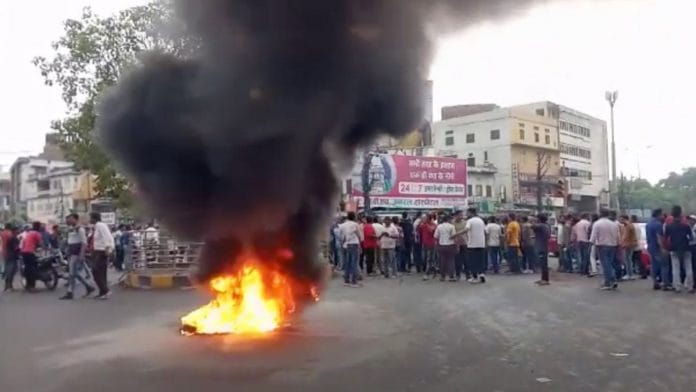On 28 June, two Muslim assailants ruthlessly beheaded a Hindu tailor over his social media post allegedly supporting the remarks of the now-dismissed BJP spokesperson Nupur Sharma on Prophet Mohammad. This incident has led to the blowing up of communal tensions that were otherwise simmering beneath the surface. The objective of my article is not to comment on a particular incident and decide who is at fault, but to highlight the extent to which communalism is slowly taking its roots in the general discourse.
There is nothing hidden in the fact that communal tensions have been flaring for a long. From the Hijab row to the Hanuman Jayanti riots to the bulldozing of the houses of protesters, religion has come up time and again as a defining and deciding factor while executing policy decisions. The central government has been criticised often for its ‘step-fatherly treatment’ of minorities. 108 former civil servants writing to PM Modi about the communal situation point to the fact that we are living in times when religion is deeply emblazoned on one’s identity.
Religion leads to the liberation of one’s soul and gives hope when all is lost. But when this very tool of uniting one with oneself is used to create divisions among people following different religions, catastrophe is expected to ensue. Throughout India’s history, there have been instances when religion has been given prominence over all other identity marks, beginning with Partition to the Anti-Sikh Riots to the Godhra incident to the targeted minority killings in Kashmir.
Also read: Udaipur killing fits the pattern of Western Islamic radicalisation. But don’t politicise it
It’s not personal, it’s strictly politics
As we hear impassioned speeches of political leaders rousing their community members, we must note that one’s personal religious beliefs and political beliefs can differ substantially. Muhammad Ali Jinnah advocated a separate Pakistan without being a devout Muslim whereas Maulana Abul Kalam opposed partition while being an Islamic Scholar. Shyama Prasad Mukherjee advocated Hindutva without being a very ardent devotee whereas Mahatma Gandhi was assertively secular while holding daily evening prayers.
Those who urge the brothers and sisters of religion to unite against other religions are more interested in their own political gains and votes than the betterment of their communities. Even those parties and leaders opposing the majoritarian regime indulge in countering oppression with oppression rather than focusing on coexistence.
While Nupur Sharma’s comments couldn’t be condoned, such radical violence against mere comments is unfounded. On top of that, bulldozing of the houses of violent protesters further adds fuel to the dog-eat-dog system that is creeping into Indian polity.
Radicalism begets radicalism. One wrong act is countered with another one by justifying one community as a victim of past wrongs. When such retribution filled actions are undertaken by governments, the public justifies such acts as the only way to teach a lesson to ‘radicalists’.
To get out of this cycle; India must show its secular credentials as assertively as it did during the partition. Leaders must reinstate the people’s faith in a government that treats all people as equal citizens who owe allegiance to one nation. National addresses and policies must be used to save the social fabric.
Also read: After Udaipur killing, BJP plans to ‘highlight growing attacks on Hindus in Gehlot’s Rajasthan’
Spiritual Smokescreen
If we recall the drawing-room discussions or newshour debates of the past few months, we will realise that they have been centered around mosques, temples, documentaries depicting goddesses in obscene manners, and inflammatory religious remarks. While we must pay heed to any religious crime and strongly condemn it, the discussions must not further fuel polarisation. The TV media has hit the goldmine with back-to-back reprisals from communities, spicy headlines and countless hours of mindless debates that numb the minds of the audience.
As citizens we can do our part by discussing the economy, geopolitics, agriculture and the education sector as often as we discuss the appropriation of one community against the other. India can be a land of innovation, opportunities, and investment only when there is a free breeding ground for productive ideas devoid of immaterial divisions.
It is high time that we really understand the inclusivity of our religion and use it to dispel any hatred used to glorify it. It might sound too idealistic and easy to say but we have more examples of coexistence than conflict of communities in the 75 years of independence.
The author is a student at Rukmani Birla Modern High School, Jaipur. views are personal







